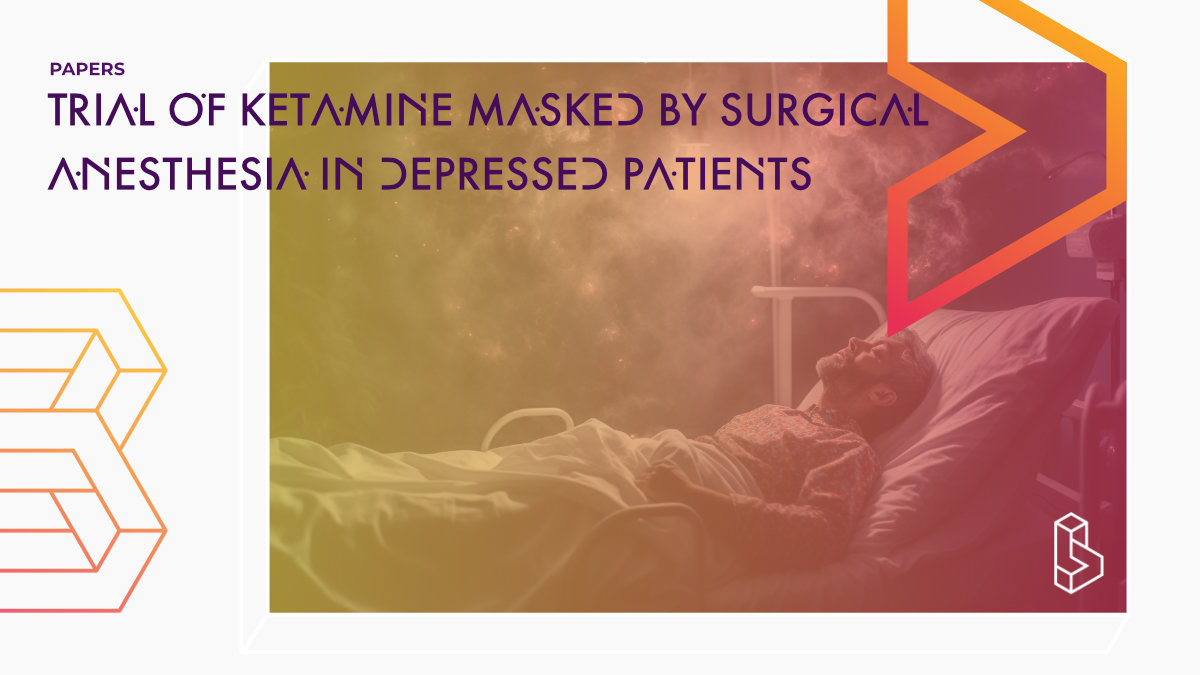This triple-masked, randomized, placebo-controlled trial (n=40) of adults with major depressive disorder (MDD) found no short-term effect on depression severity (measured by MADRS) after a single dose of intravenous ketamine (35mg/70kg) compared to placebo (saline) during anaesthesia for routine surgery.
Abstract of Randomized trial of ketamine masked by surgical anesthesia in patients with depression
“Background Ketamine may have antidepressant properties, but its acute psychoactive effects complicate successful masking in placebo-controlled trials.
Methods In a triple-masked, randomized, placebo-controlled trial, 40 adult patients with major depressive disorder were randomized to a single infusion of ketamine (0.5 mg/kg) or placebo (saline) during anesthesia for routine surgery. The primary outcome was depression severity measured by the Montgomery-Åsberg Depression Rating Scale (MADRS) at 1, 2, and 3 days post-infusion. The secondary outcome was the proportion of participants with clinical response (≥50% reduction in MADRS scores) at 1, 2, and 3 days post-infusion. After all follow-up visits, participants were asked to guess which intervention they received.
Results Mean MADRS scores did not differ between groups at screening or pre-infusion baseline. The mixed-effects model showed no evidence of effect of group assignment on post-infusion MADRS scores at 1 to 3 days post-infusion (-5.82, 95% CI -13.3 to 1.64, p=0.13). Clinical response rates were similar between groups (60% versus 50% on day 1) and comparable to previous studies of ketamine in depressed populations. Secondary and exploratory outcomes found no evidence of benefit for ketamine. 36.8% of participants guessed their treatment assignment correctly; both groups allocated their guesses in similar proportions.
Conclusion A single dose of intravenous ketamine compared to placebo has no short-term effect on the severity of depression symptoms in adults with major depressive disorder. This trial successfully masked treatment allocation in moderate-to-severely depressed patients using surgical anesthesia. While it is impractical to use surgical anesthesia for most placebo-controlled trials, future studies of novel antidepressants with acute psychoactive effects should make efforts to fully mask treatment assignment in order to minimize subject-expectancy bias. (ClinicalTrials.gov number, NCT03861988)”
Authors: Theresa R. Lii, Ashleigh E. Smith, Josephine R. Flohr, Robin L. Okada, Cynthia A. Nyongesa, Lisa J. Cianfichi, Laura M. Hack, Alan F. Schatzberg & Boris D. Heifets
Summary of Randomized trial of ketamine masked by surgical anesthesia in patients with depression
Ketamine, a dissociative anaesthetic with multiple molecular targets, is associated with rapid-acting antidepressant effects in patients with major depressive disorder, including those with treatment-resistant depression. Incomplete masking may contribute to overestimating treatment effect sizes in antidepressant trials involving ketamine. The authors used ketamine’s established safety in surgical settings to conduct a randomized placebo-controlled trial to determine if ketamine produced a greater antidepressant effect than placebo in adults with moderate-to-severe levels of MDD.
Methods
Adults undergoing elective non-cardiac, non-intracranial surgery were recruited from a perioperative mental health screening service and surgical clinics. Patients with symptomatic depression were screened by telephone pre-screen and consented to an additional screening visit. Lii et al. included patients with MDD (single or recurrent) and a major depressive episode of 4 weeks duration before screening. Exclusion criteria included pregnancy, breastfeeding, moderate or severe substance use disorder, history of schizophrenia or schizoaffective disorder, dementia or other amnestic cognitive disorder, and clinically significant thyroid dysfunction.
Find this paper
Randomized trial of ketamine masked by surgical anesthesia in patients with depression
https://doi.org/10.1038/s44220-023-00140-x
Open Access | Google Scholar | Backup | 🕊
Cite this paper (APA)
Lii, T. R., Smith, A. E., Flohr, J. R., Okada, R. L., Nyongesa, C. A., Cianfichi, L. J., ... & Heifets, B. D. (2023). Randomized Trial of Ketamine Masked by Surgical Anesthesia in Depressed Patients. medRxiv, 2023-04.
Study details
Compounds studied
Ketamine
Topics studied
Depression
Study characteristics
Placebo-Controlled
Double-Blind
Randomized
Participants
40
Humans
Institutes
Institutes associated with this publication
Stanford UniversityResearchers at Stanford are exploring the potential of ketamine, MDMA and psilocybin by connecting neuroscience, psychiatry and anesthesiology.
Linked Clinical Trial
Intraoperative Ketamine Versus Saline in Depressed Patients Undergoing Anesthesia for Non-cardiac SurgeryThis double-blind, randomized clinical trial (n=45) evaluated whether ketamine, given as part of an anaesthetic, improves depression symptoms in depressed patients undergoing non-cardiac surgery. Half of the participants received a ketamine infusion during surgery, while the other half received a placebo (normal saline).

